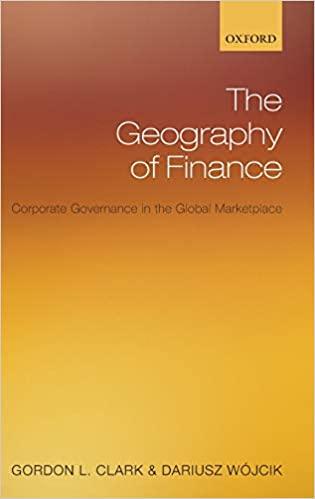Question
On January 24, 2020, an FX trading platform offered to buy the EUR/USD at $1.10222/ and sell EUR/USD at $1.10282/. The FX quote given has
On January 24, 2020, an FX trading platform offered to buy the EUR/USD at $1.10222/ and sell EUR/USD at $1.10282/. The FX quote given has a bid-ask spread (expressed in basis points, bp) of:
(A) 2.7 bp
(B) 4.5 bp
(C) 5.4 bp
(D) 8.0 bp
(E) 10 bp
If we set the real effective exchange rate index between Canada and the United States equal to 100 in 1998, and find that the U.S. dollar has risen to a value of 112.6, then from a competitive perspective the U.S. dollar is:
(A) overvalued by 6.7%
(B) overvalued by 12.6%
(C) undervalued by 6.7%
(D) undervalued by 12.6%
(E) the US dollar is more competitive
Mary Fischer is a currency speculator who enjoys "betting" on changes in the foreign currency exchange market. Currently, the spot price for the Japanese yen is 129.87/$ and the 6-month forward rate is 128.53/$. Mary thinks the yen will move to 128.00/$ in the next six months. Mary should ________ at ________ to profit from changing currency values.
(A) buy yen; the forward rate
(B) buy dollars; the forward rate
(C) sell yen; the forward rate
(D) short yen; the spot rate
(E) There is not enough information to answer this question
Naira Bolivar is the Head FX trader at More Capital, a hedge fund. Looking to profit from a triangular arbitrage trade she has US$1,000,000.00 available to invest in FX. After calling her friends in the Street she receives the following quotes: US$1.3201/ from Village Bank; 1.1898/ from TJ Magnum; and US$1.1150/ from Effex.com. Naira could (A) make a loss of US$4,920.00 by doing a triangular arbitrage
(B) earn a profit of US$4,944.32 by doing a triangular arbitrage
(C) make a loss of US$4,944.32 by doing a triangular arbitrage
(D) earn a profit of US$4,920.00 by doing a triangular arbitrage
(E) make no money through a riskless triangular arbitrage
According to the monetary approach to the balance of payments and exchange rates, please mark which of the following statements are True (T) or False (F)
( ) Under a fixed exchange rate system and expansion of credit is equal to the loss of international reserves
( ) Under a fixed exchange rate system the market-determined the money supply via the balance of payments
( ) Under a flexible exchange rate system, the central bank determines the money supply
( ) Under a flexible exchange rate system, if the central bank cuts interest rates the exchange rate will likely appreciate versus the USD
( ) Under a fixed exchange rate system, the central bank will have to devalue if it runs out of international reserves
Step by Step Solution
There are 3 Steps involved in it
Step: 1

Get Instant Access to Expert-Tailored Solutions
See step-by-step solutions with expert insights and AI powered tools for academic success
Step: 2

Step: 3

Ace Your Homework with AI
Get the answers you need in no time with our AI-driven, step-by-step assistance
Get Started


